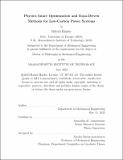Physics-Aware Optimization and Data-Driven Methods for Low-Carbon Power Systems
Author(s)
Haider, Rabab
DownloadThesis PDF (25.35Mb)
Advisor
Annaswamy, Anuradha M.
Terms of use
Metadata
Show full item recordAbstract
The US electricity sector is undergoing a transformation with aggressive targets to achieve 100% carbon pollution-free electricity by 2035. To achieve this objective while maintaining a safe and reliable power grid in the presence of intermittent renewable generation, new operating paradigms of computationally fast and accurate decision making in dynamic and safety-critical environments are needed. To this end, this thesis focuses on answering three questions: How can we enable dynamic (fast + frequent) decision making for safety-critical applications in the presence of integer constraints? How do we coordinate distributed grid-edge devices across multiple timescales and ownership boundaries? How do we develop and evaluate algorithms without access to real-world data? To address these questions this thesis proposes two physics-aware optimization frameworks that coordinate grid-edge resources towards meeting three goals: improving grid efficiency, ensuring grid operability, and supporting clean energy directives.
First, we propose Grid-SiPhyR (Sigmoidal Physics-Informed Rounding; pronounced as: ‘cipher’), a physics-informed machine learning framework for end-to-end learning to optimize for combinatorial problems, and apply it to the dynamic grid reconfiguration problem. Grid-SiPhyR employs a novel physics-informed rounding approach to tackle the mixed integer nature of dynamic reconfiguration while satisfying salient safety-critical operating constraints. Offline training of the unsupervised framework on representative load and generation data makes dynamic decision making via the online application of Grid-SiPhyR computationally feasible. Second, we propose a physics-aware distributed coordination architecture for grid-edge devices, upon which two grid services are developed. We first develop a hierarchical coordination approach for voltage regulation to coordinate slow-timescale utility-owned devices with fast-timescale solar generation towards managing grid voltages. We then develop a load ramp mitigation service to coordinate the actions of distributed storage resources to provide aggregated support at the bulk level. Lastly, we address the third question through the development of synthetic datasets with representative load and generation characteristics.
Date issued
2023-06Department
Massachusetts Institute of Technology. Department of Mechanical EngineeringPublisher
Massachusetts Institute of Technology